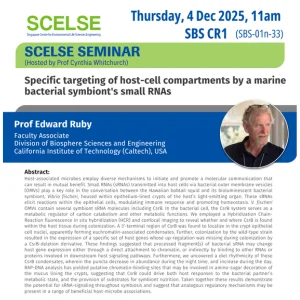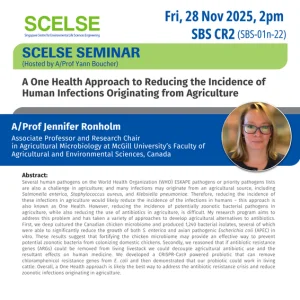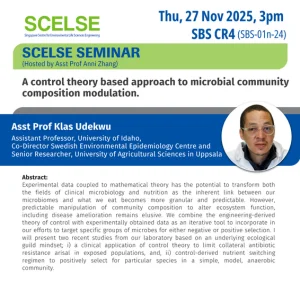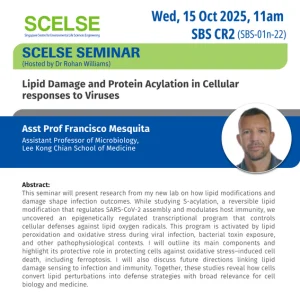Bacterial competition in the gut: Lessons from a commensal strain
Date: Tuesday, 5 Nov 2024
Time: 2pm – 3pm
Venue: NTU School of Biological Sciences Classroom TR+6 (SBS-01N-26)
Abstract:
The gut microbiota plays a crucial role in defending against enteric pathogens through colonization resistance. Though first described in the 1950s, the mechanisms behind this protection remain unclear, with few protective strains identified. Recently, we isolated a murine gut E. coli strain (E. coli 8178) that effectively eliminates Salmonella enterica serovar Typhimurium, a major cause of gastroenteritis, in a mouse model. Using in vitro and in vivo methods, we uncovered the molecular mechanism of pathogen exclusion by E. coli 8178. This research not only deepened our understanding of bacterial competition but also highlighted the roles of host and diet in pathogen displacement, opening new avenues for microbiota-mediated health interventions.
Speaker:
Dr Yassine Cherrak
Post-doctoral Research Scientist
Institute of Microbiology, ETH Zürich, Switzerland
Biography:
Yassine completed his studies in Marseille, France, and got a Master’s degree in Microbiology and an additional Master’s degree in Biological Engineering/Biotechnology. He then pursued a PhD at the CNRS (National Center for Scientific Research) and Aix-Marseille University, working in the laboratory of Eric Cascales/Eric Durand, both leading experts in bacterial secretion systems. During this time, Yassine became fascinated by the Type VI secretion system, a bacterial molecular device involved in bacterial competition, which his studied from both functional and structural perspectives. Afterward, Yassine decided to expand his expertise in bacterial competition to the in vivo context. He was awarded an EMBO Postdoctoral Fellowship and joined the group of Wolf-Dietrich Hardt at ETH Zurich in 2021, working on fascinating aspects of microbial competition and Salmonellosis in the gut. Yassine is a member of the NCCR Microbiome consortium and a formed editor at Nature Microbiology where he worked for 6 months during the pandemic.





